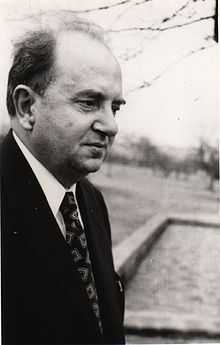Venko Markovski
| Venko Markovski | |
|---|---|
 | |
| Born |
March 5, 1915 Skoplje, Kingdom of Serbia (now Republic of Macedonia) |
| Died |
January 7, 1988 (aged 72) Sofia, Bulgaria |
| Occupation | writer, poet, politician |
| Nationality | Bulgarian[1] |
| Genres | poems, history, sonnets |
| Notable work(s) | Predania zavetni |
Venko Markovski (Bulgarian and Macedonian: Венко Марковски), born Veniamin Milanov Toshev (March 3, 1915, Skopje—January 7, 1988, Sofia) was a Bulgarian and Macedonian writer, poet, partisan and Communist politician.
Biography
Born on March 15, 1915 in Skoplje (now Skopje), Kingdom of Serbia, then occupied by Kingdom of Bulgaria, (now Republic of Macedonia), Markovski completed his secondary education in Skoplje, later studying Slavic Philology in Sofia. Markovski was a member of the Macedonian Literary Group founded in Skoplje in 1931, the Macedonian Literary Circle in Sofia, Bulgaria (1938–1941). He is an important figure in contemporary Macedonian literature after has published in 1938, what was to be the first contemporary book written in non-dialectal Macedonian language, "Narodni bigori". As the most of the left-wing politicians from Macedonia he has changed his ethnic affiliations from Bulgarian to Macedonian during the 1930s, after the recognition of the Macedonian ethnicity from the Comintern. However such Macedonian activists, members of the Bulgarian Communist Party, never managed to get rid of their pro-Bulgarian bias.[2]
During the WWII, in 1941 he was sent as Communist activist to the concentration camp in Enikyoi by the Bulgarian police. Between 1943 and 1944 he was a Yugoslav partisan in Macedonia, together with his wife and five-year old son, Mile. He wrote some of the most popular partisan marches songs of the Yugoslav partisans. Markovski participated in the National Liberation War of Macedonia and was an active political figure in Socialist Macedonia. In the period between 1944-1945 he was present for three commissions for the codification of the Macedonian alphabet. Markovski openly supported the Cominform and was subsequently imprisoned at the internment camp in Idrizovo following Yugoslavia's expulsion from the Cominform. In January 1956, Markovski was once again imprisoned, this time serving a five-year hard labor sentence at the notorious labor camp on the island of Goli otok in the Adriatic sea under the name "Veniamin Milanov Toshev" for publishing—what the authorities considered—an anti-Titoist poem "Contemporary Paradoxes" in Serbo-Croatian[3] and for his leanings towards the Soviet Union (see Informbiro).
In 1965, he left Yugoslavia supposedly in search of medical treatment in Bulgaria where he would remain until his death in 1988. In 1968 his family were expelled to Bulgaria. Markovski was accepted by the people of Bulgaria and soon began publishing in Bulgarian. Among many poems, dedicated to the ideal of Communism, he wrote a number of sonnets, publishing three books of sonnet crowns, dedicated to various historical figures. Markovski also wrote "Saga of Testaments", a history of Bulgaria in verses (with a total of 44,444 verses). Venko Markovski was a member of the Bulgarian Writers' Union, and a member of the Bulgarian Academy of Sciences (1979), and was awarded highest Bulgarian orders, among them Hero of the Socialist Labour (1975), and Hero of Bulgaria (1985). He was member of several Parliaments from 1971 until his death in 1988. Because of his works written in Bulgarian, Markovski was declared a traitor of the Macedonian nation and in 1975 was under the protection of the Bulgarian secret service as it was believed an assassination was being planned by the Yugoslav secret police, the UDBA. After coming back to his Bulgarian roots and considering his involvement with the Socialist Republic of Macedonia, Markovski stated in an interview for Bulgarian National Television only seven days prior to his death, that the ethnic Macedonians and the Macedonian language are a result of a Comintern conspiracy.[4]
Venko Markovski died on January 7, 1988, in Sofia at the age of 72. He was married and had two children, among them the writer Mile Markovski (1939–1975) and piano teacher Sultana. He has two grandsons - Internet pioneer Veni Markovski and journalist Igor Markovski. He was survived by his wife, Filimena, who died on August 26, 2012.
Bibliography
In Macedonian
- Narodni bigori (1938)
- Oginot (1938)
- Ilinden (1940)
- Lunja (1940)
- Elegii
- Goce
- Čudna e Makedonija
- Glamji
- Klime (1945)
- Nad plamnati bezdni
- Skazna za rezbarot
- Goli Otok (2009)
In Bulgarian
- Orlitsata (1941)
- Istinata e zhestoka (1968)
- Legenda za Gotse (1968), a play
- Kravta voda ne stava (1971, 1981, 2002), a response to the book "History of the Macedonian Nation"
- Predaniya zavetni (1978, also in Russian)
- Pismo do drugarkata (1979)
- Sudbovni machenitsi (1981), sonnet crown
- Buntovni voshtenitsi (1983), sonnet crown
- Vekovni varvolici (1984), sonnet crown
- Goli Otok: The Island of Death (1984, published in English)[5]
References
- ↑ With Stalin against Tito: Cominformist splits in Yugoslav Communism, Ivo Banac, Cornell University Press, 1988, ISBN 0-8014-2186-1, p. 200.
- ↑ Palmer, S. and R. King Yugoslav Communism and the Macedonian Question, Archon Books (June 1971), p. 137.
- ↑ Markovska, Sultana (August 2007), "Truths about the life and work of Venko Markovski (Истини за живота и делото на Венко Марковски)", Bulgaria Macedonia ISSN 1312-0875: 4
- ↑ Mitewa, Yulia (2001), ИДЕЯТА ЗА ЕЗИКА В МАКЕДОНСКИЯ ЛИТЕРАТУРЕН КРЪЖОК — ЕСТЕТИЧЕСКИ И ИДЕОЛОГИЧЕСКИ АСПЕКТИ, Veliko Tarnovo: Litera
- ↑ Goli Otok at the Hathi Trust Digital Library
External links
- Site with books by Venko Markovski and his son Mile Markovski
- The site of Venko Markovski's grandson
- Interview with Venko Markovski widow, Filimena (in Bulgarian)
|